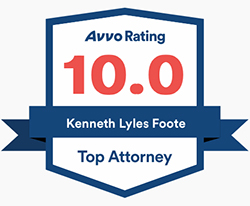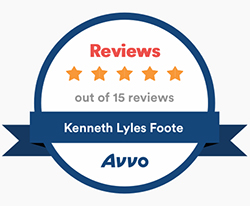Juvenile Defense Attorneys
Most children under 18 year of age are charged as juveniles and their cases are held in juvenile court however in Florida, any child 14 or older may be tried as an adult or "direct filed" and can face serious adult penalties. At the Law Offices of K.L. Foote, our attorneys are former felony and misdemeanor prosecutors who know exactly how to defend a juvenile case. We understand the future implications of a criminal record on your child. We know the effect conviction could have on your child's future, jeopardizing future career and educational opportunities. The juvenile defense attorneys at K.L. Foote understand the need to have a juvenile's case resolved without a conviction.
The Juvenile Justice System is different than the Adult Criminal Justice System because the focus is on rehabilitating juveniles, rather than punishing them. There are no juries at juvenile court, a judge decides all issues.
Stages of Juvenile Cases in the Court System
The Juvenile Justice System is very different than the adult criminal system and cases generally travel through the juvenile courts faster than the adult court. Please call 1-877-903-6683 to speak with an experienced juvenile defense attorney immediately and learn your child's options.
- Arrest:
- 1. Law enforcement arrests the accused juvenile at the time of the crime. Law enforcement completes an arrest document, which states the charges against the accused. If there is no arrest at the time of the crime, law enforcement investigates.
2. Law enforcement presents a sworn complaint with evidence to the State Attorney's Office. The State Attorney determines if there is probable cause to believe that the suspect committed the crime (see filing decision). - Detention Hearing:
- If the juvenile is held in the detention center the court holds a detention hearing within 24 hours of the arrest. It is usually held the morning after the arrest. The Judge decides whether to release the defendant and if so, what conditions are necessary. The judge can order the defendant to have no contact with the victim or witness. If the Judge does not release the defendant, he or she may remain in the detention center for up to 21 days.
- Arraignment:
- After filing a petition, the juvenile defendant is entitled to an arraignment hearing. At the arraignment, the defendant is notified of the charges against him/her. The Judge then determines if the defendant needs the assistance of an attorney. If the defendant cannot afford to hire an attorney, the court appoints a public defender to represent them. At this time, either the defendant or their attorney enters a plea of guilty, not guilty or nolo contendere (no contest) to the charge.
If a plea of not guilty is entered, the case proceeds through the system. If a plea of guilty or no contest is entered, the defendant may be sentenced immediately, or the case may be set for a disposition hearing - It is important that you have retained a juvenile defense attorney by this time as the case will likely be scheduled for trial less than four weeks after the arraignment.
- Discovery:
- Between the arraignment date and the trial date your defense attorney and State Attorneys engage in a process known as discovery. During the discovery period any witness, including the victim, may be subpoenaed to give a sworn statement under oath to the defense attorney as to their knowledge of the case. Florida law allows the defense attorney to interview witnesses prior to trial. This interview is called a deposition. The victim/witness may receive a subpoena from the defendant 's attorney requiring the victim to appear to have their deposition taken.
- The State Attorney is also compelled to provide the defense attorney with any reports, documents, or recordings they may have.
- Pretrial Diversion Programs:
- There are several pre-trial diversion programs available to first-time offenders. Most commonly first-time offenders are referred to Teen Court. Your Florida juvenile defense attorney can play an integral role in getting a juvenile offender into a pretrial interntion program.
- Plea Negotiations and Change of Plea:
- In many cases, the defendant will change their previously entered plea of not guilty to either guilty or no contest before going to trial. This plea may be a result of discussions between the ASA and the defendant's juvenile defense attorney. Usually the defendant will plead to the crime in exchange for some concession. The concession may involve a lesser charge, dismissal of other pending charges, or a recommendation by the prosecutor for a reduced sentence.
- Trial:
- Juvenile cases are tried before a Judge only with no jury. As the trial approaches, you will receive a subpoena from the State Attorney's Office announcing the date, time and place at which you need to appear for the trial. Remember that if you do not appear, the Judge may charge you with contempt of court.
At the trial, the Judge will most likely order that all witnesses stay out of the courtroom except during their testimony.
The juvenile offender may or may not present witnesses on their behalf. The defendant may or may not testify. The juvenile defendant does have the right to be in the courtroom during the trial. - The Verdict:
- The Judge decides whether the defendant is guilty or not guilty, and announces the verdict aloud in the courtroom.
- If the defendant is guilty, the Judge may order the Department of Juvenile Justice to prepare a predisposition report recommending sanctions for your child.
- Pre-Disposition Reports:
- Often the Court request that the Department of Juvenile Justice (DJJ) complete a PDR on the juvenile defendant before sentencing. This is an inquiry into the background, criminal history and circumstances of the defendant. The PDR includes a sentencing recommendation for the Judge to review.
- Dispositional Hearings:
- The Judge sentences the defendant in a manner appropriate to the crime and other circumstances related to the case. The Judge may either place the defendant on juvenile probation or commitment to the DJJ.
- Compliance Hearings:
- If the defendant fails to comply with their probation requirements, they may be set for a compliance hearing. Compliance hearing are generally reserved for failure to payback restitution and/or court costs.
Beyond Court:
Not only must your child be defended through is process, but many times they need intervention so that problematic behavior does not happen again. The juvenile defense attorneys at K.L. Foote can refer your child for services such as counseling, therapy, or other help that may help your child get back on the right path without a criminal record that may haunt him for the rest of their life. Please call 1-877-903-6683 to speak with an experienced juvenile defense attorney immediately and learn your child's legal options.






